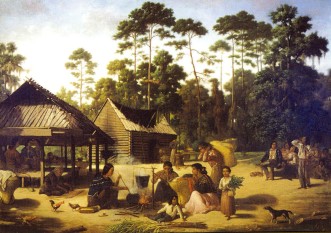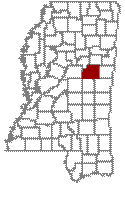|
Welcome to the Winston Co. MSGenWeb!
 |
Choctaw Village near
the Chefuncte, by Francois Bernard, 1869, Peabody
Museum - Harvard University. The women are preparing
dye to color cane strips for making baskets
François Bernard - http://www.peabody.harvard.edu/col/longDisplay.cfm?ObjectKey=60124 |
Choctaw Indian legends say the tribe originated at Nanih Waiya in
what is now the extreme southeastern part of Winston County. A large mound at Nanih Waiya is a sacred place to the Choctaws and is
preserved today as a Mississippi State Park.
Winston County is one of 16 Mississippi counties formed in the 1830s
from lands ceded to the United States in September 1830 by Chief
Greenwood LeFleur, the Chief of the Choctaws, in the Treaty of Dancing
Rabbit Creek. Soon after the treaty was signed, most of the Choctaws
were removed to what is now the State of Oklahoma. The few Choctaws who remained in Mississippi after the 1830 treaty
were the direct ancestors of the Mississippi Band of Choctaw Indians,
today one of themost prosperous and progressive Indian tribes in
America.
Winston County was established December 23, 1833. Louisville was
charted in 1836. Both were named for the same man, Louis Winston, a
Natchez lawyer then prominent in Mississippi politics. Colonel Louis Winston (1784-1824), a native of Virginia, moved to the
Mississippi Territory and became a prominent lawyer and the colonel of a
regiment of militia. In 1809 he was appointed the district attorney
general for Madison County, but it appears that he moved to the Natchez
District in about 1817. He was the secretary of the Constitutional
Convention of 1817, and he served as a judge of the Mississippi Supreme
Court from 1821 until his death, on August 20, 1824, at his home in
Washington, Mississippi. By the start of the American Civil War, Louisville was a prosperous
city, serving as a regional commercial center. Although there were no Civil War battles fought in Winston County,
more than 400 Winston County men died in the service of the Confederacy
during the war.
Several prominent Winston Countians lost fortunes loaned to the
Confederacy.
Union Colonel Benjamin H. Grierson marched his 900 troops through
Louisville on April 22, 1863 while on his famous "raid" through the
heart of Mississippi. Grierson's troops camped for the night in Winston
County. There was no fighting. Having been spared from significant
destruction of property, Louisville and Winston County recovered earlier
than some other places in the South and continued to grow after the war.
Much of Winston County's economic strength, starting from the
earliest years of the 20th century, came from the plentiful growth of
timber. The timber industry and industries closely allied to it
continue today as the back bone of the local community, as witnessed by
the large Georgia Pacific Plant and other industries.
New Louis Taunton Book
Taunton Publishers announces the
publication of Excerpts from The Winston County Journal and The Plattsburg
Times 1892 - 1899. Plattsburg was a thriving community in the southern
part of the county at one time, but today has a cemetery, church and maybe three
houses. In this volume, Louis continues to chronicle the births, deaths,
obits, visitations of people coming to visit (especially from Texas) and those
moving in and out of Winston County.
|

